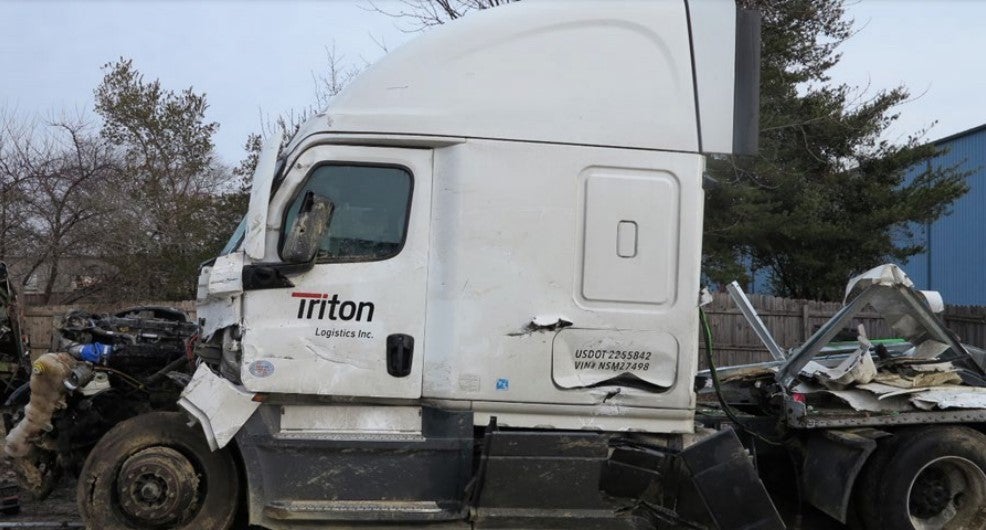WASHNGTON — Safety investigators have warned the Federal Motor Carrier Safety Administration to tighten electronic logging device (ELD) requirements to prevent trucking companies and their drivers from creating fake driver hours-of-service (HOS) logs.
The recommendation by the National Transportation Safety Board was included in a crash report issued on Wednesday concluding that truck driver fatigue, due to excessive driving time and limited opportunity to sleep, was the probable cause of a December 2022 crash on I-64 in Virginia in which the truck driver rammed the back of medium-size bus, killing three people.
“Contributing to the truck driver’s fatigue was the motor carrier, Triton Logistics Incorporated, which created fictitious driver accounts in the electronic logging device system and enabled drivers to operate their vehicles for hours in excess of federal regulations,” the NTSB stated.
Over the course of the 20-month investigation, the NTSB found that management of the Romeoville, Illinois-based trucking company would instruct drivers to manipulate ELD driver logs when they exceeded their federal drive-time limits.
“Specifically, the drivers would call in to the carrier’s HOS department by cell phone and the carrier would log them into the alternate driver account, which allowed them to continue driving under a false account and circumvent the HOS regulations,” the NTSB report stated.

Daniel Cramer, 61, the driver of the truck involved in the crash, described to investigators the existence of a data center in Lithuania “that Triton used to manage — and when needed, manipulate — drivers’ electronic logs to make it look like they had more time for rest than they really did,” according to WAVY.com reporting in March.
In the days leading up to the crash, Cramer had exceeded FMCSA’s 14-hour driving window four times and the 11-hour driving limit three times. He had also exceeded the 70-hour rule by more than 4 hours in a period of 7 consecutive days.
“Also, because drivers were paid by the mile, they were financially incentivized to exceed their HOS limits because it allowed them to drive farther and earn more money,” NTSB stated.
The agency noted that Triton’s chief executive officer and the HOS manager denied knowing about fictitious logins. The company did not respond to phone calls by FreightWaves seeking comment on the report’s findings.
After an on-site focused review conducted of Triton after the crash, FMCSA found violations that included making, or permitting a driver to make, a false report regarding their duty status and allowing a driver to exceed HOS limits.
FMCSA fined Triton $36,170 for those violations along with failure to conduct post-crash alcohol testing. It also assigned Triton a “conditional” safety rating, which means a carrier does not have adequate safety management controls in place to ensure compliance with the safety fitness standards.
As a result of the investigation, NTSB recommended that FMCSA revise ELD requirements to require that ELD providers create an audit log that includes:
- Date.
- Driver login time and who logged them in.
- Names of anyone who edited the log.
- Driver’s license numbers.
- Active driver list changes.
Other recommendations include:
- The Commonwealth of Virginia should offer management safety guidance to new intrastate motor carrier licensees covering license class, drug and alcohol testing, fatigue management, vehicle maintenance, and safe commercial vehicle operation.
- Triton Logistics should implement a process to regularly verify the accuracy of drivers’ records of duty, implement a strong fatigue management program, and use onboard inward- and forward-facing video event recording to improve driver training.
- Commercial Vehicle Safety Alliance should use this crash to educate members on the importance of safeguarding the ELD system to prevent falsification of information.
NTSB also reiterated two previous recommendations:
- National Highway Traffic Safety Administration should complete the development of performance standards to assess forward collision avoidance systems in commercial vehicles. NHTSA should also require that all trucks over 10,000 pounds be equipped with onboard video recorders that record event data.
- FMCSA should provide guidance to motor carriers on the use of onboard video recordings to ensure driver compliance with regulations and safe operations.
